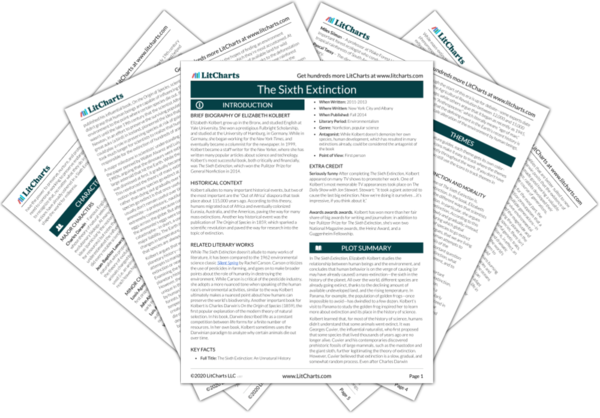Charles Darwin Quotes in The Sixth Extinction
Darwin's familiarity with human-caused extinction is also clear from On the Origin of Species. In one of the many passages in which he heaps scorn on the catastrophists, he observes that animals inevitably become rare before they become extinct, "we know this has been the progress of events with those animals which have been exterminated, either locally or wholly, through man's agency." It's a brief allusion and in its brevity, suggestive. Darwin assumes that his readers are familiar with such "events" and already habituated to them. He himself seems to find nothing remarkable or troubling about this.
But how, then, to make sense of cases like the great auk or the Charles Island tortoise or, to continue the list, the dodo or the Steller's sea cow? These animals had obviously not been done in by a rival species gradually evolving some competitive advantage. They had all been killed off by the same species, and all quite suddenly—in the case of the great auk and the Charles Island tortoise over the course of Darwin's own lifetime. Either there had to be a separate category for human-caused extinction, in which case people really did deserve their "special status" as a creature outside of nature, or space in the natural order had to be made for cataclysm, in which case, Cuvier— distressingly—was right.
Darwin's successors inherited the "much slow extermination” problem. The uniformitarian view precluded sudden or sweeping change of any kind. But the more that was learned about the fossil record, the more difficult it was to maintain that an entire age spanning tens of millions of years, had somehow or other gone missing. This growing tension led to a series of increasingly tortured explanations. Perhaps there had been some sort of “crisis,” at the close of the Cretaceous but it had to have been a very slow crisis. Maybe the losses at the end of the period did constitute a "mass extinction."

Charles Darwin Quotes in The Sixth Extinction
Darwin's familiarity with human-caused extinction is also clear from On the Origin of Species. In one of the many passages in which he heaps scorn on the catastrophists, he observes that animals inevitably become rare before they become extinct, "we know this has been the progress of events with those animals which have been exterminated, either locally or wholly, through man's agency." It's a brief allusion and in its brevity, suggestive. Darwin assumes that his readers are familiar with such "events" and already habituated to them. He himself seems to find nothing remarkable or troubling about this.
But how, then, to make sense of cases like the great auk or the Charles Island tortoise or, to continue the list, the dodo or the Steller's sea cow? These animals had obviously not been done in by a rival species gradually evolving some competitive advantage. They had all been killed off by the same species, and all quite suddenly—in the case of the great auk and the Charles Island tortoise over the course of Darwin's own lifetime. Either there had to be a separate category for human-caused extinction, in which case people really did deserve their "special status" as a creature outside of nature, or space in the natural order had to be made for cataclysm, in which case, Cuvier— distressingly—was right.
Darwin's successors inherited the "much slow extermination” problem. The uniformitarian view precluded sudden or sweeping change of any kind. But the more that was learned about the fossil record, the more difficult it was to maintain that an entire age spanning tens of millions of years, had somehow or other gone missing. This growing tension led to a series of increasingly tortured explanations. Perhaps there had been some sort of “crisis,” at the close of the Cretaceous but it had to have been a very slow crisis. Maybe the losses at the end of the period did constitute a "mass extinction."











